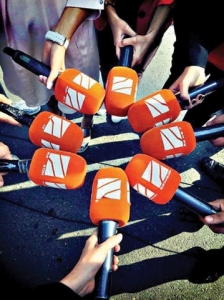Constitutional Court Rules for the Survival of Georgian Democracy
On November 11, the Tbilisi City Court gave Nika Gvaramia, Rustavi 2 Chief, the right to rule the TV Company again after initially calling for him to be replaced.
Gvaramia said the decision is “part of [Judge] Tamaz Urtmelidze’s pseudo judiciary,” questioning the urgency of the decision “when the Constitutional Court is considering the appeal.”
The following day, on November 12th, in accordance with the Constitutional Court and Judge Tamaz Urtmelidze’s decision, the authority of temporary manager of Rustavi 2 Revaz Sakevarishvili was suspended and that of Davit Dvali abolished.
The Court ruled in favor of restoring the powers to Nika Gvaramia and Kakha Damenia, Rustavi 2 Financial Director.
The issue of Rustavi 2, Georgia’s largest TV Company, was discussed during the meeting of the US-Georgia Strategic Partnership Commission (SPC) Democracy and Governance Working Group on November 12th in Washington DC.
The Georgian Foreign Ministry (MFA) said that the Georgian and US sides agreed on the importance of a fair, level, and competitive playing field for political parties and candidates in the lead-up to the October 2016 parliamentary elections, as well as an open, pluralistic, and independent space for political, media, and civil society voices.
The MFA said the United States appreciated the government’s efforts to move forward with the Rustavi2 court appeals and preserve media pluralism in Georgia.
After the Constitutional Court ruled against the initial judgement of the Tbilisi City Court’s Urtmelidze, who is accused of being a puppet of the government, Georgian civil society representatives rejoiced that the Constitutional Court has survived [the experience] as an example of the country’s democratic future.
Rustavi 2 continues to be an active supporter of Georgia’s Euro-Atlantic integration process and democratization. The TV company has long been exasperating the government, having investigated a number of governmental scandals and revealed certain cases of nepotism not to mention reporting repeatedly on the mass unemployment, increased crime and economic decline.
Moreover, the TV company does not hide its ideological affiliation with Georgia’s key oppositional party United National Movement, the main issue of the government’s concern in qualifying the media source as a UNM-proxy.
The Chief of the Company, who held a number of leading positions in the ex-government, denies any direct involvement of the UNM in the activities of Rustavi 2, claiming freedom of speech as Rustavi 2’s goal to contributing to Georgia’s Euro-Atlantic integration and the very foundations the TV company stands for.
Zviad Adzinbaia












